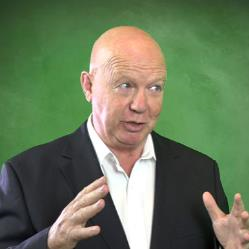"The Future of Selling - five key steps to building trusted relationships" - A 'Talking Sales' discussion with John Smibert
When we first approach a new customers we have no relationship. If we identify an opportunity we start the selling process without a relationship. This cannot be ideal.
As John Bedwany told me; "Most of the pipeline that comes, no matter what type of demand generation you do, is what we call pipeline without relationships, because it's ad hoc".
 He said "We forget we're human beings. We don't buy unless we trust the person we're buying from and we trust what they say and we trust that what the product or the solution they're going to buy is going to deliver. If you don't have the relationship before the engagement, the chances are you're going to lose it".
He said "We forget we're human beings. We don't buy unless we trust the person we're buying from and we trust what they say and we trust that what the product or the solution they're going to buy is going to deliver. If you don't have the relationship before the engagement, the chances are you're going to lose it".
So what can we do about this? How can we ensure we have a trusted relationship before an opportunity is identified?
I asked these questions of John - and his answers were most enlightening. Read below of view the video to learn what he said.
The sales productivity strategies discussed here should be of value to CEO's COO's, CSO's and sales leaders.
************
John Bedwany is the CEO of The Database Dept. He is a thought leader and a disruptive thinker who helps his clients achieve extraordinary productivity in sales and marketing.
Interview
John S.: I'm delighted to have John Bedwany with me again - welcome back, John!
John B.: Thanks, John!
John S.: John, in challenge number six in the B2B sales area that you have you talk a lot about pipeline requiring trusted relationships, and make sure that you're building those relationships as you build your pipeline.
John B.: Yes.
John S.: Tell me why you think that's important?
John B.: First of all, let's just go back a second. Most of the pipeline that comes, no matter what type of demand generation you do, is what we call pipeline without relationships, because it's ad hoc. It's, "Let's talk to a few people, let's see what happens, bring it across."
 John S.: Yes, some sort of marketing programme, bang-bang out there, somebody says, "Yes, I might be interested in talking to somebody," and you know nothing about them, other than the fact that you've got a name and a number.
John S.: Yes, some sort of marketing programme, bang-bang out there, somebody says, "Yes, I might be interested in talking to somebody," and you know nothing about them, other than the fact that you've got a name and a number.
John B.: Correct. Now, look what that does to the sales cycle. I've now got to get a salesperson, who will accept or may not say they accept it, they accept the opportunity, they've engaged with the buyer, they've qualified that they are worthy enough to go through the process with them, then they're going to spend a lot of money and they've got to close the deal within a very short period of time. We forget we're human beings. We don't buy unless we trust the person we're buying from and we trust what they say and we trust that what the product or the solution they're going to buy is going to deliver. If you don't have the relationship before the engagement, the chances are you're going to lose it.
John S.: But from what I understand, you're strategically looking at building a relationship without the salesperson involved until the right time, so the salesperson won't have that relationship.
John B.: The company must have the relationship.
John S.: Okay, so you're now focused on the relationship with a company versus a relationship with individuals.
 John B.: Individuals come and go, they have to stay on brand and stay one the company's promise, so it's about the company. The issue we've got there, John, is simply this. All that stuff sounds sensible. How do you do it? We need to, as an industry, find a metric way in understanding where are they in the journey towards trust and how do we move them from one step to another. We believe it's a five-step journey, and I'm happy to discuss that at any other point in time, but generally it's from "I don't know you, I don't care for you," all the way to "I trust you," and the three steps between those two.
John B.: Individuals come and go, they have to stay on brand and stay one the company's promise, so it's about the company. The issue we've got there, John, is simply this. All that stuff sounds sensible. How do you do it? We need to, as an industry, find a metric way in understanding where are they in the journey towards trust and how do we move them from one step to another. We believe it's a five-step journey, and I'm happy to discuss that at any other point in time, but generally it's from "I don't know you, I don't care for you," all the way to "I trust you," and the three steps between those two.
John S.: And by "you" you mean the company, not the individual.
John B.: Always the company. And then you've got to align messages and experiences by metric across the journey towards trust, and when you've got that what you're then doing is you're showing the organisation that not only are you speaking to the contact, you're showing how you're moving towards trust with your company.
John S.: And you're saying you should be able to measure as you go through your five stages where you're at and what level of trust you have got.
John B.: Absolutely. Look, if you can't, then how do you actually measure the performance and strategic market management of an organisation?
John S.: You're still back with a shotgun, aren't you, versus a rifle?
John B.: Absolutely. And not only that, there's no strategic management, it's just, "Let's talk to a lot of people and see what happens," and even though we all talk about doing it, it has to be done, and it's a five-step process.
John S.: Can you tell me what you think the five steps are?
John B.: Well, it's very simple. The first is the question mark, I don't know you and I don't care about you." The second is the tick, "Yes, I've heard of you guys, but it's not for me." The third is the "Aha" phase. "Aha - now I see the value of your organisation, but I'm not interested." The fourth is permission to educate. "Would you educate me, because it sounds like there may be something here for me?" and then if you educate with transparency and relevance, they trust you. And every step must be accompanied by strategic coverage and by integrated messaging based on how the customer wants to absorb information.
 John S.: Well, if you're going to work through those five stages of trust, you're going to have to make sure it's strategic, you're going to have good data and understanding of where that specific customer is, the individuals within the organisation you're working with as well as the company, and the level of trust they have with you through those five stages.
John S.: Well, if you're going to work through those five stages of trust, you're going to have to make sure it's strategic, you're going to have good data and understanding of where that specific customer is, the individuals within the organisation you're working with as well as the company, and the level of trust they have with you through those five stages.
John B.: That's exactly right.
John S.: Hey, that makes a lot of sense to me, John.
John B.: Come and work for me, John! [laughter]
John S.: Wow, that's an offer! Hey, thank you very much - I look forward to talking about challenge number seven next time!
John B.: Thank you!
****************
More discussions with John Bedwany:
****************

Your Invitation: I invite you to join the Sales Leader Forum group on LinkedIn where you can experience informative discussions with your peers and sales thought leaders on subjects like the one we have discussed here. I also invite you to subscribe to the
- Sales Leader Resource Centre here
- Sales Leader YouTube channel here (300+ sales leadership videos)
Please Share: If you valued this article, please share via your Twitter, LinkedIn, Google+ and Facebook social media platforms. I encourage you to join the conversation or ask questions. So feel free to add a comment on this post - I promise to respond. If inclined please follow my LinkedIn post page here.
Want to touch base? If you have questions please feel free to contact me - email: john.smibert(at)salesleaderforums.com, Phone: +61 404857893 or Skype: john.smibert